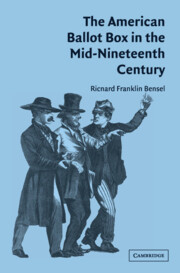Book contents
- Frontmatter
- Contents
- Preface
- Chapter 1 Introduction
- Chapter 2 Structure and Practice of Elections
- Chapter 3 Social Construction of Identity in Eastern Rural Communities
- Chapter 4 Ethno-Cultural Stereotypes and Voting in Large Cities
- Chapter 5 Frontier Democracy
- Chapter 6 Loyalty Oaths, Troops, and Elections during the Civil War
- Chapter 7 Conclusion
- Index
Chapter 7 - Conclusion
Published online by Cambridge University Press: 10 November 2009
- Frontmatter
- Contents
- Preface
- Chapter 1 Introduction
- Chapter 2 Structure and Practice of Elections
- Chapter 3 Social Construction of Identity in Eastern Rural Communities
- Chapter 4 Ethno-Cultural Stereotypes and Voting in Large Cities
- Chapter 5 Frontier Democracy
- Chapter 6 Loyalty Oaths, Troops, and Elections during the Civil War
- Chapter 7 Conclusion
- Index
Summary
Scholars have celebrated American democracy from many different perspectives. Some have seen democratic practices as a social ritual through which communal identity is learned and reinforced. This identity, in turn, underpins the social cohesion and understandings that allow any society to function as a political community. Others have valued democracy more for what it requires than for what it does. They have viewed freedom of speech, freedom of religion, and freedom of assembly – all of them products of democracy – as the most important ends served by a democratic system. From this perspective, democracy becomes an ideology that entails freedom as a consequence. And it is the consequence, not the process itself, that justifies democracy. From yet a third perspective, members of the pluralist school have seen democracy as the best defense against public chaos and disorder. The way they see it, democratic institutions almost magically adjust government policy to the popular will – much as the hidden hand of the market matches economic production to consumer demand. Finally, there are those who take a more jaundiced view. These scholars cite the pathologies associated with popular government, among them tyrannical majorities, simplistic election slogans, and the social inefficiencies thus induced in public policy. For them, the only things worse than democracy are the alternatives.
Not surprisingly, perhaps, nineteenth-century American democracy can be viewed from all of these perspectives. As communal identity, for example, suffrage eligibility marked the boundaries and shaped the content of what it meant to be an American during the global flowering of the nation-state.
The core of that identity was the northern, rural, native-born, white, Protestant male.
- Type
- Chapter
- Information
- The American Ballot Box in the Mid-Nineteenth Century , pp. 286 - 298Publisher: Cambridge University PressPrint publication year: 2004



